BMA735 Management Ethics: Case Study Analysis Assignment
VerifiedAdded on 2023/03/31
|16
|3800
|361
Case Study
AI Summary
This case study analysis examines three real-world cases – Retail Food Group (RFG), IOOF Holdings, and Bupa Seaforth – from a management ethics perspective. The analysis identifies key ethical issues within each case, such as accounting malpractices, exploitation of franchisees, whistleblowing challenges, governance failures, and dishonesty. The study explores the financial devastation faced by RFG franchisees due to unethical practices, the scandals that plagued IOOF, and the issues of aged care in Bupa's facilities. The report utilizes ethical theories to propose and justify strategies and recommendations for addressing the identified ethical problems, including the use of auditing, legal knowledge, and adherence to deontological principles. The assignment emphasizes the importance of ethical conduct, compliance, and good governance in business operations, offering practical solutions for mitigating ethical risks and promoting responsible management practices. The analysis provides a thorough examination of the cases, incorporating references to academic literature and providing actionable insights for students of management ethics.
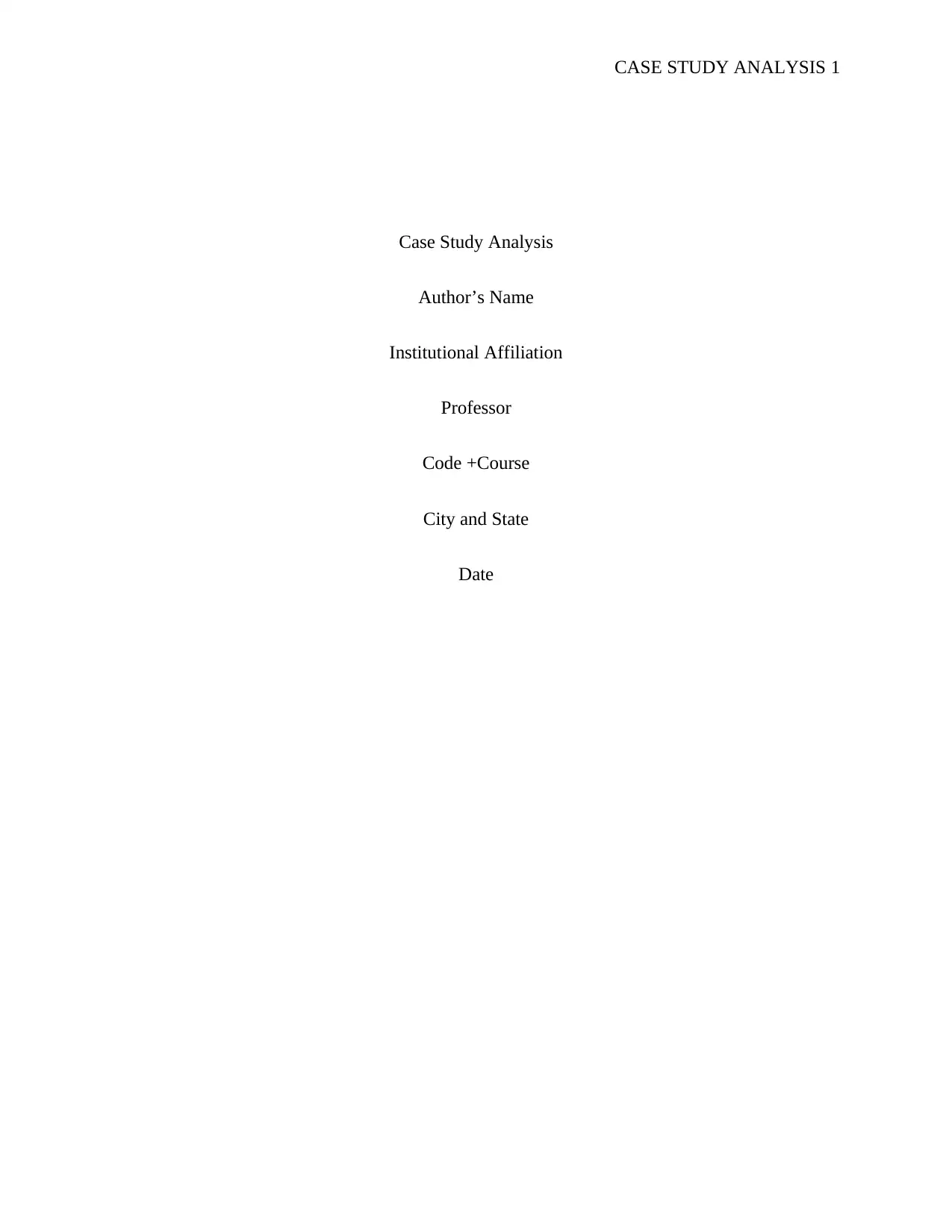
CASE STUDY ANALYSIS 1
Case Study Analysis
Author’s Name
Institutional Affiliation
Professor
Code +Course
City and State
Date
Case Study Analysis
Author’s Name
Institutional Affiliation
Professor
Code +Course
City and State
Date
Paraphrase This Document
Need a fresh take? Get an instant paraphrase of this document with our AI Paraphraser
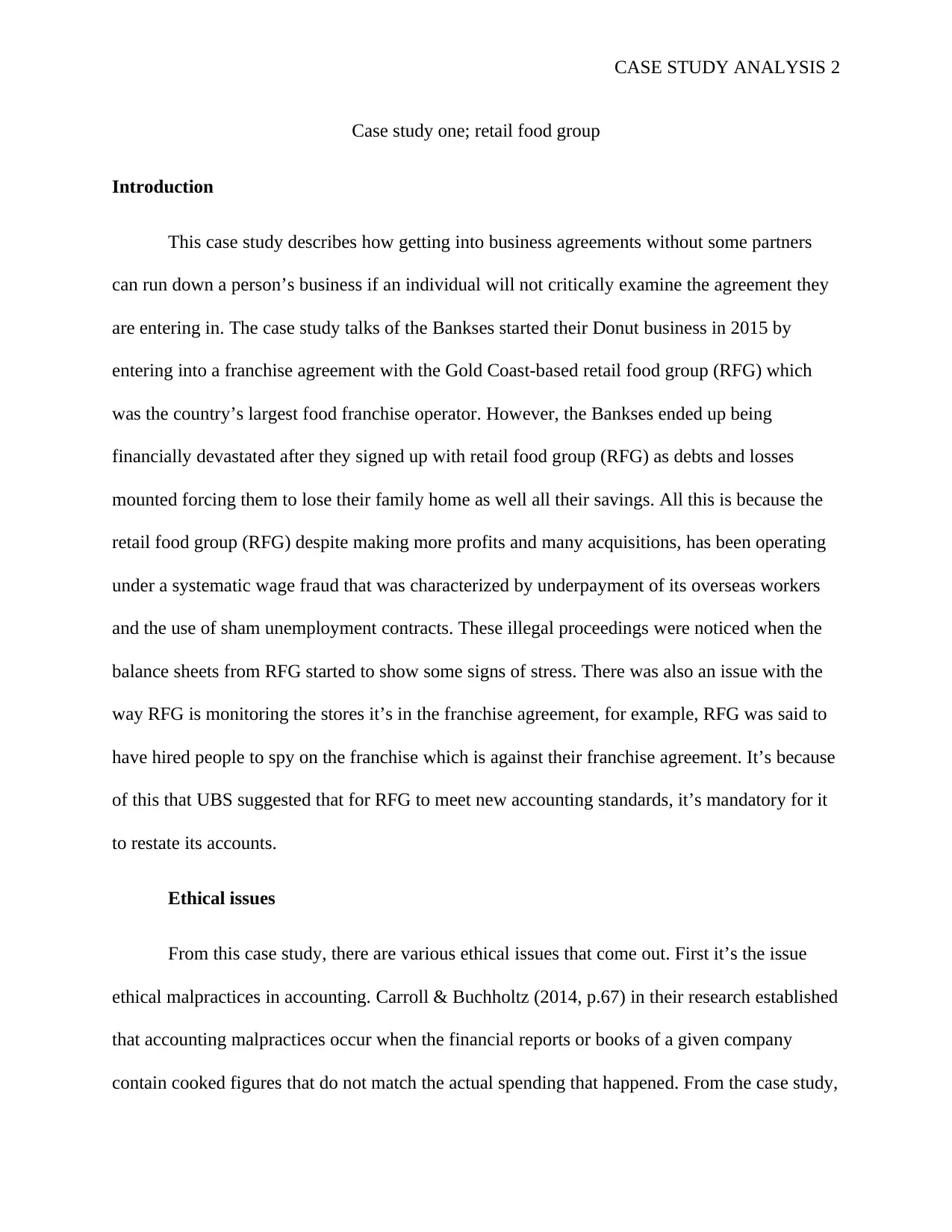
CASE STUDY ANALYSIS 2
Case study one; retail food group
Introduction
This case study describes how getting into business agreements without some partners
can run down a person’s business if an individual will not critically examine the agreement they
are entering in. The case study talks of the Bankses started their Donut business in 2015 by
entering into a franchise agreement with the Gold Coast-based retail food group (RFG) which
was the country’s largest food franchise operator. However, the Bankses ended up being
financially devastated after they signed up with retail food group (RFG) as debts and losses
mounted forcing them to lose their family home as well all their savings. All this is because the
retail food group (RFG) despite making more profits and many acquisitions, has been operating
under a systematic wage fraud that was characterized by underpayment of its overseas workers
and the use of sham unemployment contracts. These illegal proceedings were noticed when the
balance sheets from RFG started to show some signs of stress. There was also an issue with the
way RFG is monitoring the stores it’s in the franchise agreement, for example, RFG was said to
have hired people to spy on the franchise which is against their franchise agreement. It’s because
of this that UBS suggested that for RFG to meet new accounting standards, it’s mandatory for it
to restate its accounts.
Ethical issues
From this case study, there are various ethical issues that come out. First it’s the issue
ethical malpractices in accounting. Carroll & Buchholtz (2014, p.67) in their research established
that accounting malpractices occur when the financial reports or books of a given company
contain cooked figures that do not match the actual spending that happened. From the case study,
Case study one; retail food group
Introduction
This case study describes how getting into business agreements without some partners
can run down a person’s business if an individual will not critically examine the agreement they
are entering in. The case study talks of the Bankses started their Donut business in 2015 by
entering into a franchise agreement with the Gold Coast-based retail food group (RFG) which
was the country’s largest food franchise operator. However, the Bankses ended up being
financially devastated after they signed up with retail food group (RFG) as debts and losses
mounted forcing them to lose their family home as well all their savings. All this is because the
retail food group (RFG) despite making more profits and many acquisitions, has been operating
under a systematic wage fraud that was characterized by underpayment of its overseas workers
and the use of sham unemployment contracts. These illegal proceedings were noticed when the
balance sheets from RFG started to show some signs of stress. There was also an issue with the
way RFG is monitoring the stores it’s in the franchise agreement, for example, RFG was said to
have hired people to spy on the franchise which is against their franchise agreement. It’s because
of this that UBS suggested that for RFG to meet new accounting standards, it’s mandatory for it
to restate its accounts.
Ethical issues
From this case study, there are various ethical issues that come out. First it’s the issue
ethical malpractices in accounting. Carroll & Buchholtz (2014, p.67) in their research established
that accounting malpractices occur when the financial reports or books of a given company
contain cooked figures that do not match the actual spending that happened. From the case study,
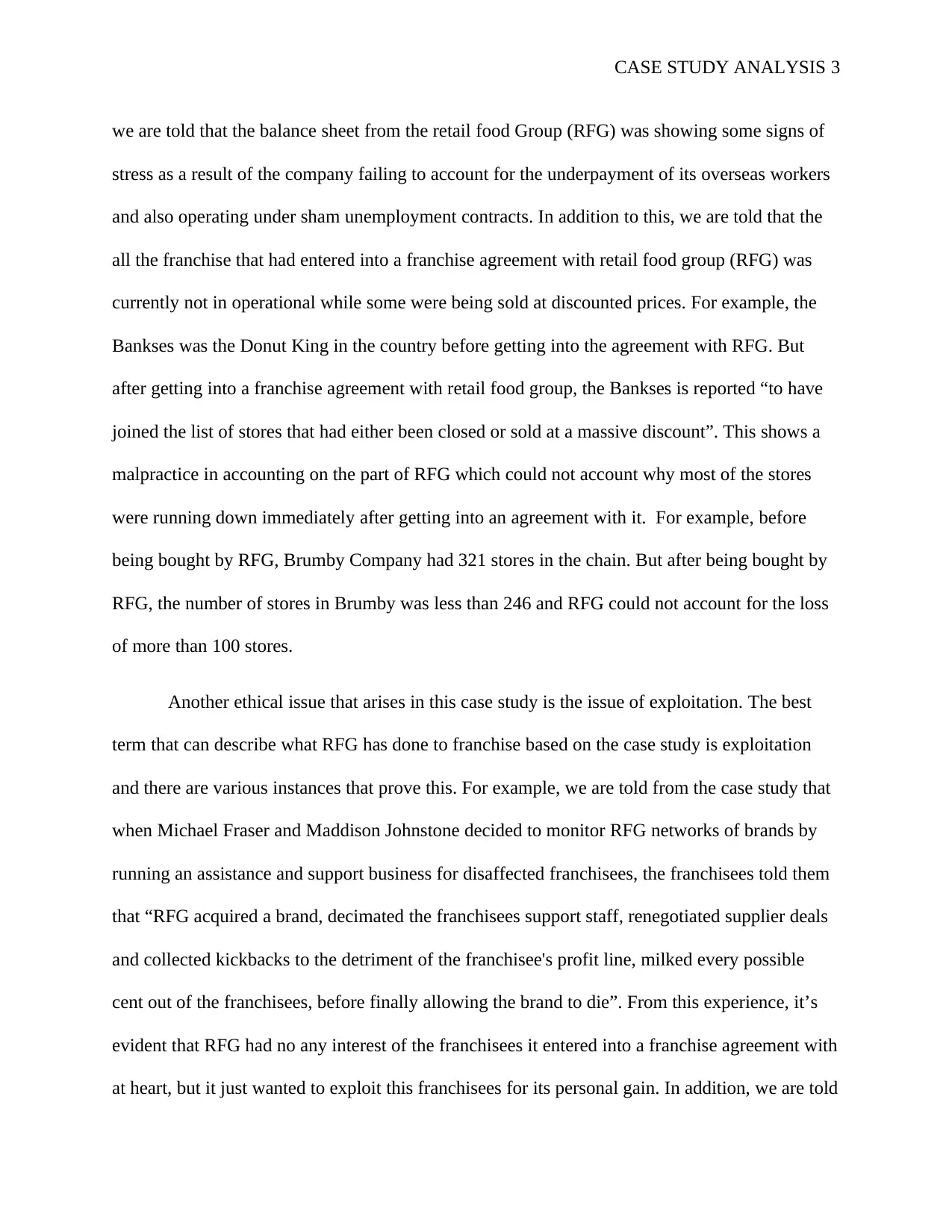
CASE STUDY ANALYSIS 3
we are told that the balance sheet from the retail food Group (RFG) was showing some signs of
stress as a result of the company failing to account for the underpayment of its overseas workers
and also operating under sham unemployment contracts. In addition to this, we are told that the
all the franchise that had entered into a franchise agreement with retail food group (RFG) was
currently not in operational while some were being sold at discounted prices. For example, the
Bankses was the Donut King in the country before getting into the agreement with RFG. But
after getting into a franchise agreement with retail food group, the Bankses is reported “to have
joined the list of stores that had either been closed or sold at a massive discount”. This shows a
malpractice in accounting on the part of RFG which could not account why most of the stores
were running down immediately after getting into an agreement with it. For example, before
being bought by RFG, Brumby Company had 321 stores in the chain. But after being bought by
RFG, the number of stores in Brumby was less than 246 and RFG could not account for the loss
of more than 100 stores.
Another ethical issue that arises in this case study is the issue of exploitation. The best
term that can describe what RFG has done to franchise based on the case study is exploitation
and there are various instances that prove this. For example, we are told from the case study that
when Michael Fraser and Maddison Johnstone decided to monitor RFG networks of brands by
running an assistance and support business for disaffected franchisees, the franchisees told them
that “RFG acquired a brand, decimated the franchisees support staff, renegotiated supplier deals
and collected kickbacks to the detriment of the franchisee's profit line, milked every possible
cent out of the franchisees, before finally allowing the brand to die”. From this experience, it’s
evident that RFG had no any interest of the franchisees it entered into a franchise agreement with
at heart, but it just wanted to exploit this franchisees for its personal gain. In addition, we are told
we are told that the balance sheet from the retail food Group (RFG) was showing some signs of
stress as a result of the company failing to account for the underpayment of its overseas workers
and also operating under sham unemployment contracts. In addition to this, we are told that the
all the franchise that had entered into a franchise agreement with retail food group (RFG) was
currently not in operational while some were being sold at discounted prices. For example, the
Bankses was the Donut King in the country before getting into the agreement with RFG. But
after getting into a franchise agreement with retail food group, the Bankses is reported “to have
joined the list of stores that had either been closed or sold at a massive discount”. This shows a
malpractice in accounting on the part of RFG which could not account why most of the stores
were running down immediately after getting into an agreement with it. For example, before
being bought by RFG, Brumby Company had 321 stores in the chain. But after being bought by
RFG, the number of stores in Brumby was less than 246 and RFG could not account for the loss
of more than 100 stores.
Another ethical issue that arises in this case study is the issue of exploitation. The best
term that can describe what RFG has done to franchise based on the case study is exploitation
and there are various instances that prove this. For example, we are told from the case study that
when Michael Fraser and Maddison Johnstone decided to monitor RFG networks of brands by
running an assistance and support business for disaffected franchisees, the franchisees told them
that “RFG acquired a brand, decimated the franchisees support staff, renegotiated supplier deals
and collected kickbacks to the detriment of the franchisee's profit line, milked every possible
cent out of the franchisees, before finally allowing the brand to die”. From this experience, it’s
evident that RFG had no any interest of the franchisees it entered into a franchise agreement with
at heart, but it just wanted to exploit this franchisees for its personal gain. In addition, we are told
⊘ This is a preview!⊘
Do you want full access?
Subscribe today to unlock all pages.

Trusted by 1+ million students worldwide
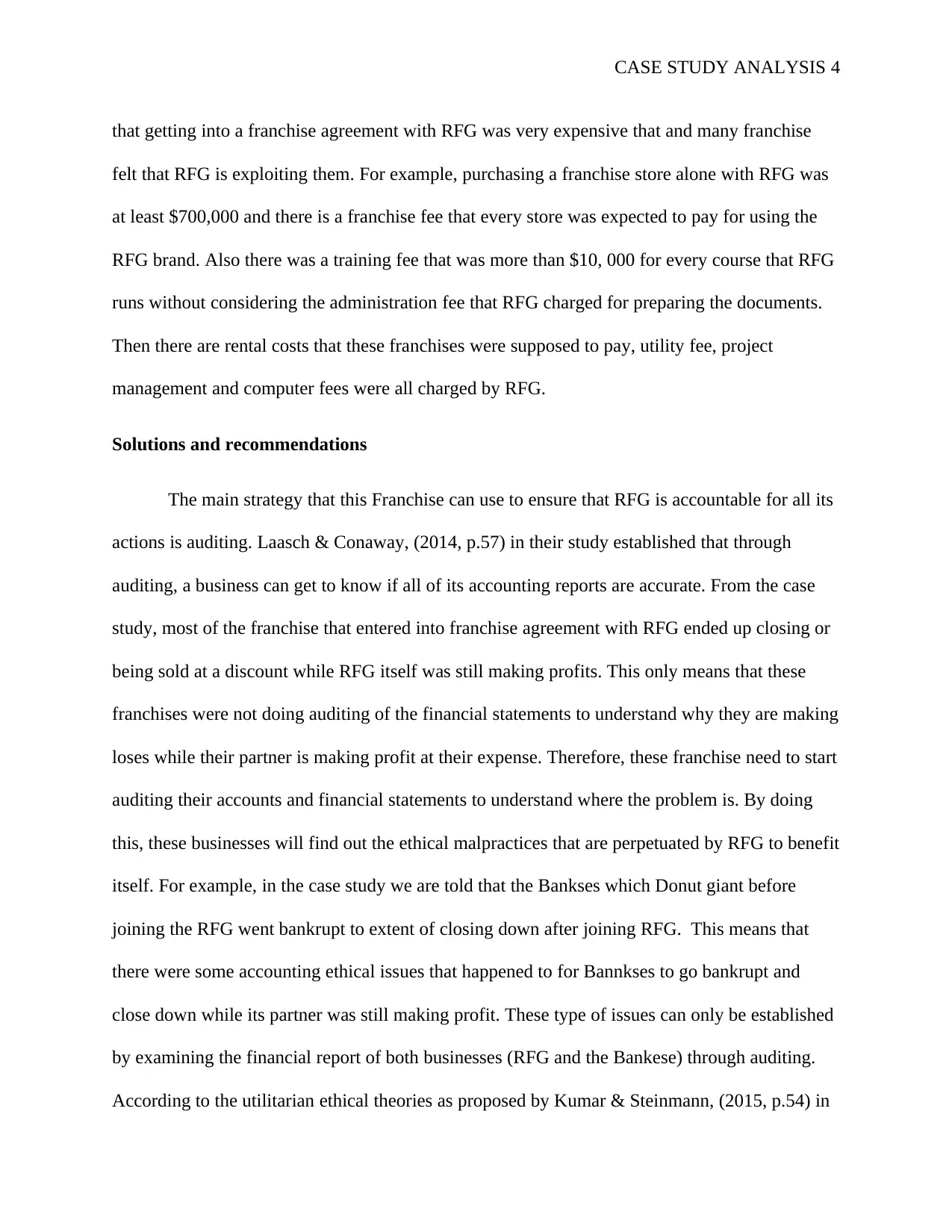
CASE STUDY ANALYSIS 4
that getting into a franchise agreement with RFG was very expensive that and many franchise
felt that RFG is exploiting them. For example, purchasing a franchise store alone with RFG was
at least $700,000 and there is a franchise fee that every store was expected to pay for using the
RFG brand. Also there was a training fee that was more than $10, 000 for every course that RFG
runs without considering the administration fee that RFG charged for preparing the documents.
Then there are rental costs that these franchises were supposed to pay, utility fee, project
management and computer fees were all charged by RFG.
Solutions and recommendations
The main strategy that this Franchise can use to ensure that RFG is accountable for all its
actions is auditing. Laasch & Conaway, (2014, p.57) in their study established that through
auditing, a business can get to know if all of its accounting reports are accurate. From the case
study, most of the franchise that entered into franchise agreement with RFG ended up closing or
being sold at a discount while RFG itself was still making profits. This only means that these
franchises were not doing auditing of the financial statements to understand why they are making
loses while their partner is making profit at their expense. Therefore, these franchise need to start
auditing their accounts and financial statements to understand where the problem is. By doing
this, these businesses will find out the ethical malpractices that are perpetuated by RFG to benefit
itself. For example, in the case study we are told that the Bankses which Donut giant before
joining the RFG went bankrupt to extent of closing down after joining RFG. This means that
there were some accounting ethical issues that happened to for Bannkses to go bankrupt and
close down while its partner was still making profit. These type of issues can only be established
by examining the financial report of both businesses (RFG and the Bankese) through auditing.
According to the utilitarian ethical theories as proposed by Kumar & Steinmann, (2015, p.54) in
that getting into a franchise agreement with RFG was very expensive that and many franchise
felt that RFG is exploiting them. For example, purchasing a franchise store alone with RFG was
at least $700,000 and there is a franchise fee that every store was expected to pay for using the
RFG brand. Also there was a training fee that was more than $10, 000 for every course that RFG
runs without considering the administration fee that RFG charged for preparing the documents.
Then there are rental costs that these franchises were supposed to pay, utility fee, project
management and computer fees were all charged by RFG.
Solutions and recommendations
The main strategy that this Franchise can use to ensure that RFG is accountable for all its
actions is auditing. Laasch & Conaway, (2014, p.57) in their study established that through
auditing, a business can get to know if all of its accounting reports are accurate. From the case
study, most of the franchise that entered into franchise agreement with RFG ended up closing or
being sold at a discount while RFG itself was still making profits. This only means that these
franchises were not doing auditing of the financial statements to understand why they are making
loses while their partner is making profit at their expense. Therefore, these franchise need to start
auditing their accounts and financial statements to understand where the problem is. By doing
this, these businesses will find out the ethical malpractices that are perpetuated by RFG to benefit
itself. For example, in the case study we are told that the Bankses which Donut giant before
joining the RFG went bankrupt to extent of closing down after joining RFG. This means that
there were some accounting ethical issues that happened to for Bannkses to go bankrupt and
close down while its partner was still making profit. These type of issues can only be established
by examining the financial report of both businesses (RFG and the Bankese) through auditing.
According to the utilitarian ethical theories as proposed by Kumar & Steinmann, (2015, p.54) in
Paraphrase This Document
Need a fresh take? Get an instant paraphrase of this document with our AI Paraphraser
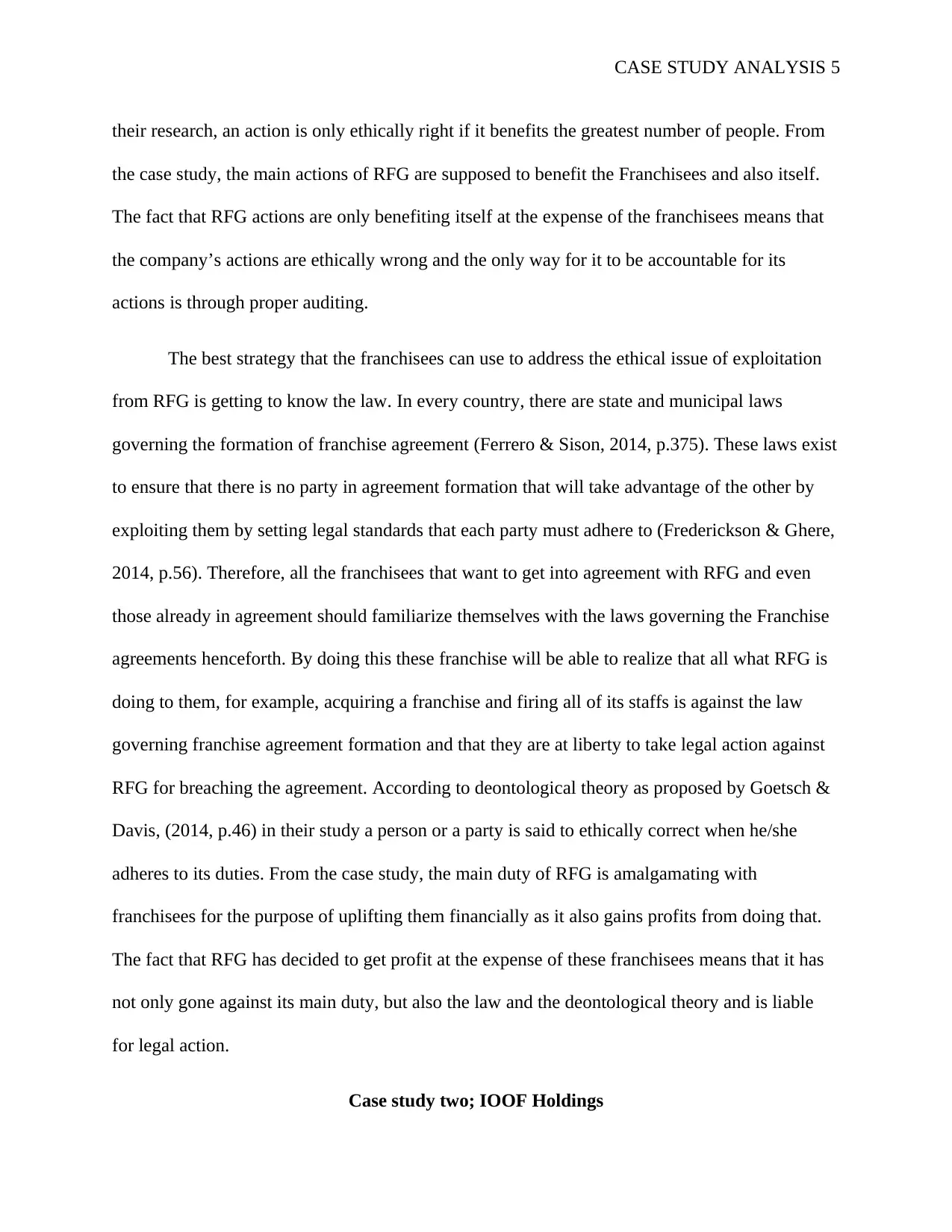
CASE STUDY ANALYSIS 5
their research, an action is only ethically right if it benefits the greatest number of people. From
the case study, the main actions of RFG are supposed to benefit the Franchisees and also itself.
The fact that RFG actions are only benefiting itself at the expense of the franchisees means that
the company’s actions are ethically wrong and the only way for it to be accountable for its
actions is through proper auditing.
The best strategy that the franchisees can use to address the ethical issue of exploitation
from RFG is getting to know the law. In every country, there are state and municipal laws
governing the formation of franchise agreement (Ferrero & Sison, 2014, p.375). These laws exist
to ensure that there is no party in agreement formation that will take advantage of the other by
exploiting them by setting legal standards that each party must adhere to (Frederickson & Ghere,
2014, p.56). Therefore, all the franchisees that want to get into agreement with RFG and even
those already in agreement should familiarize themselves with the laws governing the Franchise
agreements henceforth. By doing this these franchise will be able to realize that all what RFG is
doing to them, for example, acquiring a franchise and firing all of its staffs is against the law
governing franchise agreement formation and that they are at liberty to take legal action against
RFG for breaching the agreement. According to deontological theory as proposed by Goetsch &
Davis, (2014, p.46) in their study a person or a party is said to ethically correct when he/she
adheres to its duties. From the case study, the main duty of RFG is amalgamating with
franchisees for the purpose of uplifting them financially as it also gains profits from doing that.
The fact that RFG has decided to get profit at the expense of these franchisees means that it has
not only gone against its main duty, but also the law and the deontological theory and is liable
for legal action.
Case study two; IOOF Holdings
their research, an action is only ethically right if it benefits the greatest number of people. From
the case study, the main actions of RFG are supposed to benefit the Franchisees and also itself.
The fact that RFG actions are only benefiting itself at the expense of the franchisees means that
the company’s actions are ethically wrong and the only way for it to be accountable for its
actions is through proper auditing.
The best strategy that the franchisees can use to address the ethical issue of exploitation
from RFG is getting to know the law. In every country, there are state and municipal laws
governing the formation of franchise agreement (Ferrero & Sison, 2014, p.375). These laws exist
to ensure that there is no party in agreement formation that will take advantage of the other by
exploiting them by setting legal standards that each party must adhere to (Frederickson & Ghere,
2014, p.56). Therefore, all the franchisees that want to get into agreement with RFG and even
those already in agreement should familiarize themselves with the laws governing the Franchise
agreements henceforth. By doing this these franchise will be able to realize that all what RFG is
doing to them, for example, acquiring a franchise and firing all of its staffs is against the law
governing franchise agreement formation and that they are at liberty to take legal action against
RFG for breaching the agreement. According to deontological theory as proposed by Goetsch &
Davis, (2014, p.46) in their study a person or a party is said to ethically correct when he/she
adheres to its duties. From the case study, the main duty of RFG is amalgamating with
franchisees for the purpose of uplifting them financially as it also gains profits from doing that.
The fact that RFG has decided to get profit at the expense of these franchisees means that it has
not only gone against its main duty, but also the law and the deontological theory and is liable
for legal action.
Case study two; IOOF Holdings
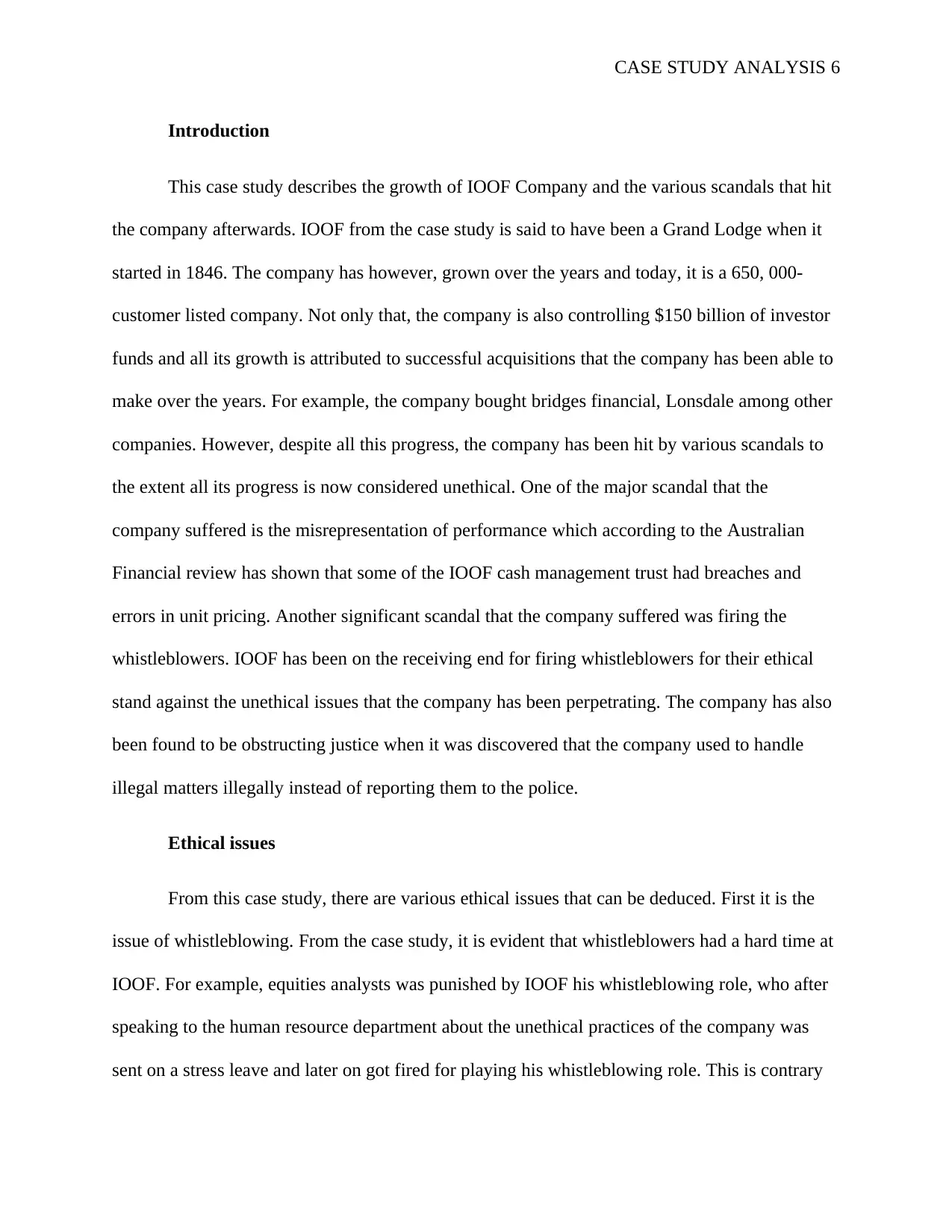
CASE STUDY ANALYSIS 6
Introduction
This case study describes the growth of IOOF Company and the various scandals that hit
the company afterwards. IOOF from the case study is said to have been a Grand Lodge when it
started in 1846. The company has however, grown over the years and today, it is a 650, 000-
customer listed company. Not only that, the company is also controlling $150 billion of investor
funds and all its growth is attributed to successful acquisitions that the company has been able to
make over the years. For example, the company bought bridges financial, Lonsdale among other
companies. However, despite all this progress, the company has been hit by various scandals to
the extent all its progress is now considered unethical. One of the major scandal that the
company suffered is the misrepresentation of performance which according to the Australian
Financial review has shown that some of the IOOF cash management trust had breaches and
errors in unit pricing. Another significant scandal that the company suffered was firing the
whistleblowers. IOOF has been on the receiving end for firing whistleblowers for their ethical
stand against the unethical issues that the company has been perpetrating. The company has also
been found to be obstructing justice when it was discovered that the company used to handle
illegal matters illegally instead of reporting them to the police.
Ethical issues
From this case study, there are various ethical issues that can be deduced. First it is the
issue of whistleblowing. From the case study, it is evident that whistleblowers had a hard time at
IOOF. For example, equities analysts was punished by IOOF his whistleblowing role, who after
speaking to the human resource department about the unethical practices of the company was
sent on a stress leave and later on got fired for playing his whistleblowing role. This is contrary
Introduction
This case study describes the growth of IOOF Company and the various scandals that hit
the company afterwards. IOOF from the case study is said to have been a Grand Lodge when it
started in 1846. The company has however, grown over the years and today, it is a 650, 000-
customer listed company. Not only that, the company is also controlling $150 billion of investor
funds and all its growth is attributed to successful acquisitions that the company has been able to
make over the years. For example, the company bought bridges financial, Lonsdale among other
companies. However, despite all this progress, the company has been hit by various scandals to
the extent all its progress is now considered unethical. One of the major scandal that the
company suffered is the misrepresentation of performance which according to the Australian
Financial review has shown that some of the IOOF cash management trust had breaches and
errors in unit pricing. Another significant scandal that the company suffered was firing the
whistleblowers. IOOF has been on the receiving end for firing whistleblowers for their ethical
stand against the unethical issues that the company has been perpetrating. The company has also
been found to be obstructing justice when it was discovered that the company used to handle
illegal matters illegally instead of reporting them to the police.
Ethical issues
From this case study, there are various ethical issues that can be deduced. First it is the
issue of whistleblowing. From the case study, it is evident that whistleblowers had a hard time at
IOOF. For example, equities analysts was punished by IOOF his whistleblowing role, who after
speaking to the human resource department about the unethical practices of the company was
sent on a stress leave and later on got fired for playing his whistleblowing role. This is contrary
⊘ This is a preview!⊘
Do you want full access?
Subscribe today to unlock all pages.

Trusted by 1+ million students worldwide
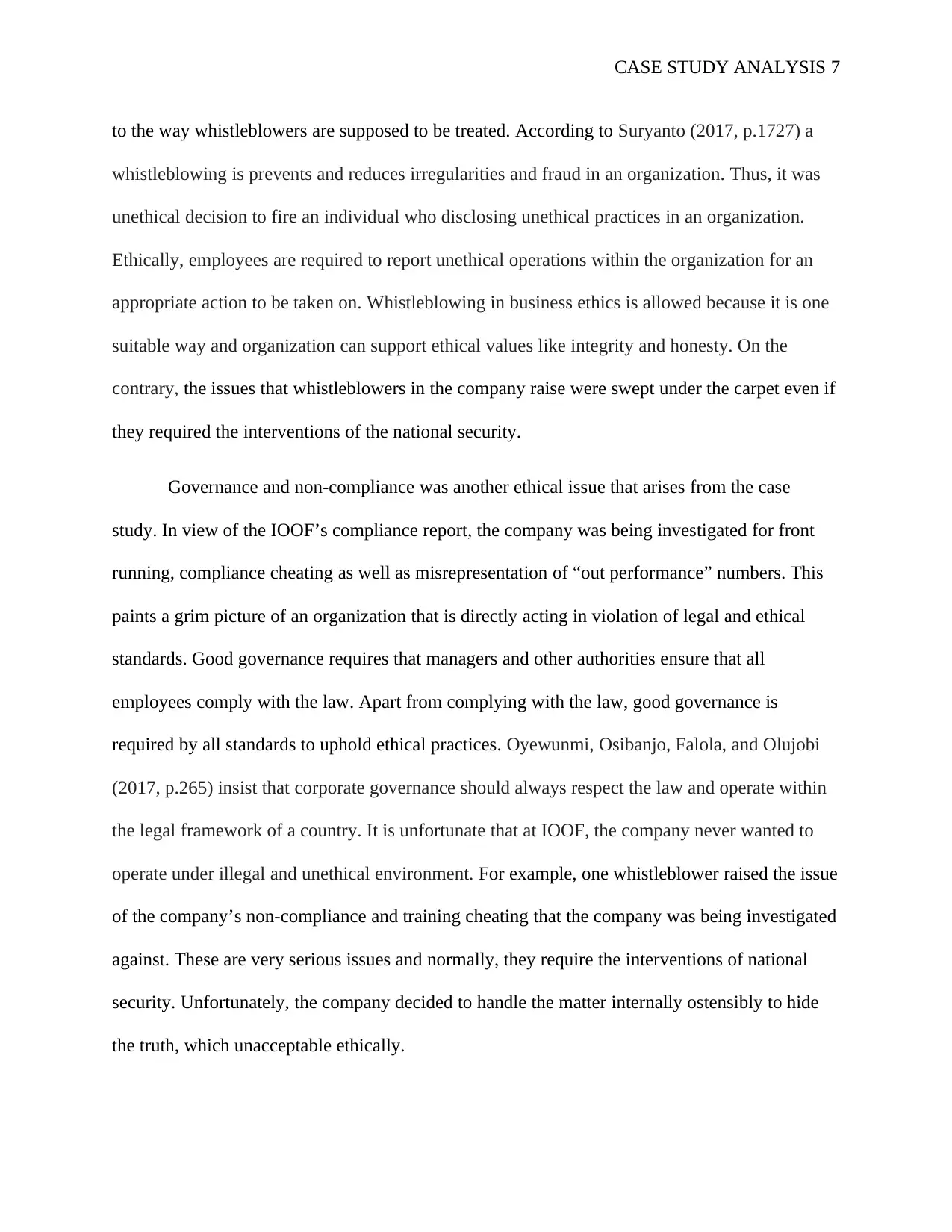
CASE STUDY ANALYSIS 7
to the way whistleblowers are supposed to be treated. According to Suryanto (2017, p.1727) a
whistleblowing is prevents and reduces irregularities and fraud in an organization. Thus, it was
unethical decision to fire an individual who disclosing unethical practices in an organization.
Ethically, employees are required to report unethical operations within the organization for an
appropriate action to be taken on. Whistleblowing in business ethics is allowed because it is one
suitable way and organization can support ethical values like integrity and honesty. On the
contrary, the issues that whistleblowers in the company raise were swept under the carpet even if
they required the interventions of the national security.
Governance and non-compliance was another ethical issue that arises from the case
study. In view of the IOOF’s compliance report, the company was being investigated for front
running, compliance cheating as well as misrepresentation of “out performance” numbers. This
paints a grim picture of an organization that is directly acting in violation of legal and ethical
standards. Good governance requires that managers and other authorities ensure that all
employees comply with the law. Apart from complying with the law, good governance is
required by all standards to uphold ethical practices. Oyewunmi, Osibanjo, Falola, and Olujobi
(2017, p.265) insist that corporate governance should always respect the law and operate within
the legal framework of a country. It is unfortunate that at IOOF, the company never wanted to
operate under illegal and unethical environment. For example, one whistleblower raised the issue
of the company’s non-compliance and training cheating that the company was being investigated
against. These are very serious issues and normally, they require the interventions of national
security. Unfortunately, the company decided to handle the matter internally ostensibly to hide
the truth, which unacceptable ethically.
to the way whistleblowers are supposed to be treated. According to Suryanto (2017, p.1727) a
whistleblowing is prevents and reduces irregularities and fraud in an organization. Thus, it was
unethical decision to fire an individual who disclosing unethical practices in an organization.
Ethically, employees are required to report unethical operations within the organization for an
appropriate action to be taken on. Whistleblowing in business ethics is allowed because it is one
suitable way and organization can support ethical values like integrity and honesty. On the
contrary, the issues that whistleblowers in the company raise were swept under the carpet even if
they required the interventions of the national security.
Governance and non-compliance was another ethical issue that arises from the case
study. In view of the IOOF’s compliance report, the company was being investigated for front
running, compliance cheating as well as misrepresentation of “out performance” numbers. This
paints a grim picture of an organization that is directly acting in violation of legal and ethical
standards. Good governance requires that managers and other authorities ensure that all
employees comply with the law. Apart from complying with the law, good governance is
required by all standards to uphold ethical practices. Oyewunmi, Osibanjo, Falola, and Olujobi
(2017, p.265) insist that corporate governance should always respect the law and operate within
the legal framework of a country. It is unfortunate that at IOOF, the company never wanted to
operate under illegal and unethical environment. For example, one whistleblower raised the issue
of the company’s non-compliance and training cheating that the company was being investigated
against. These are very serious issues and normally, they require the interventions of national
security. Unfortunately, the company decided to handle the matter internally ostensibly to hide
the truth, which unacceptable ethically.
Paraphrase This Document
Need a fresh take? Get an instant paraphrase of this document with our AI Paraphraser
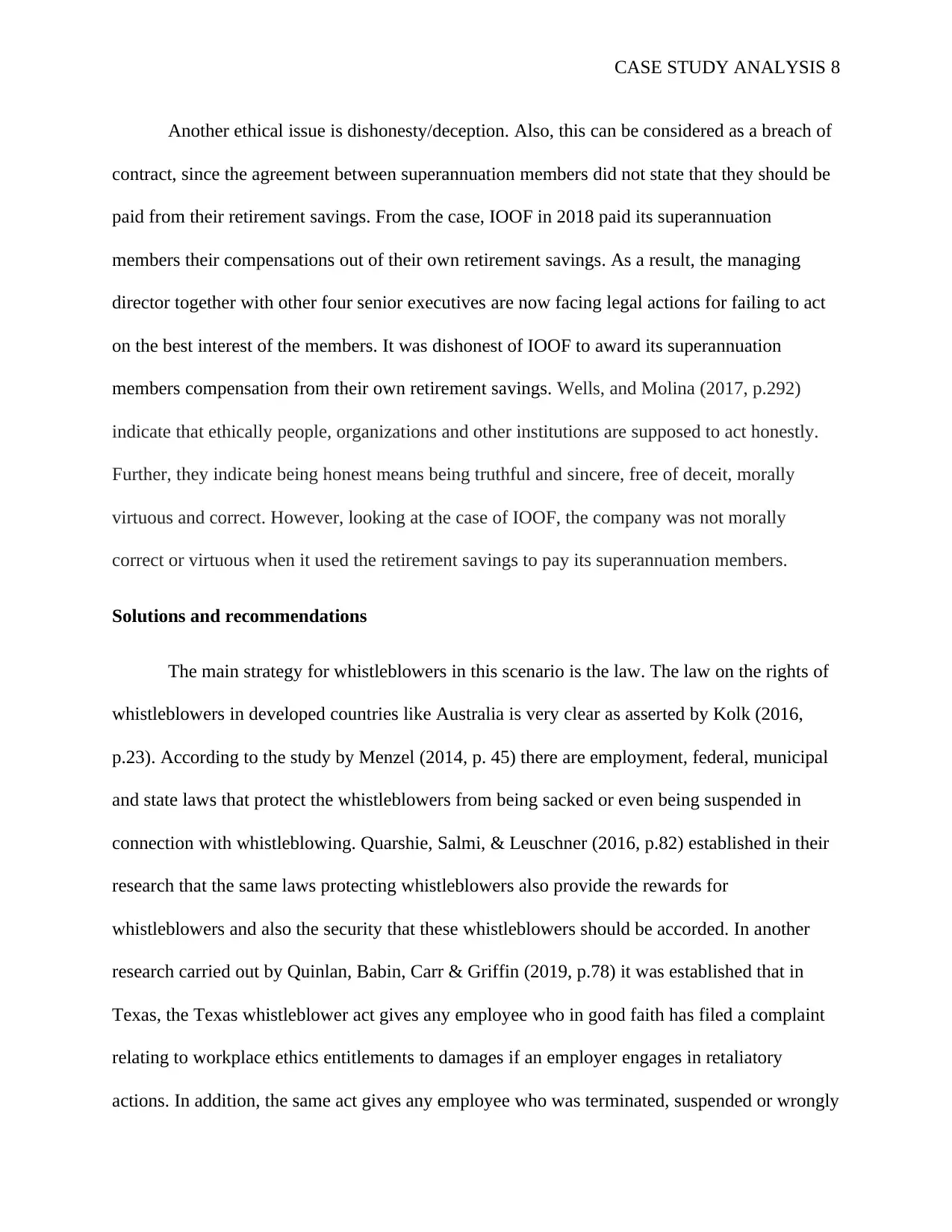
CASE STUDY ANALYSIS 8
Another ethical issue is dishonesty/deception. Also, this can be considered as a breach of
contract, since the agreement between superannuation members did not state that they should be
paid from their retirement savings. From the case, IOOF in 2018 paid its superannuation
members their compensations out of their own retirement savings. As a result, the managing
director together with other four senior executives are now facing legal actions for failing to act
on the best interest of the members. It was dishonest of IOOF to award its superannuation
members compensation from their own retirement savings. Wells, and Molina (2017, p.292)
indicate that ethically people, organizations and other institutions are supposed to act honestly.
Further, they indicate being honest means being truthful and sincere, free of deceit, morally
virtuous and correct. However, looking at the case of IOOF, the company was not morally
correct or virtuous when it used the retirement savings to pay its superannuation members.
Solutions and recommendations
The main strategy for whistleblowers in this scenario is the law. The law on the rights of
whistleblowers in developed countries like Australia is very clear as asserted by Kolk (2016,
p.23). According to the study by Menzel (2014, p. 45) there are employment, federal, municipal
and state laws that protect the whistleblowers from being sacked or even being suspended in
connection with whistleblowing. Quarshie, Salmi, & Leuschner (2016, p.82) established in their
research that the same laws protecting whistleblowers also provide the rewards for
whistleblowers and also the security that these whistleblowers should be accorded. In another
research carried out by Quinlan, Babin, Carr & Griffin (2019, p.78) it was established that in
Texas, the Texas whistleblower act gives any employee who in good faith has filed a complaint
relating to workplace ethics entitlements to damages if an employer engages in retaliatory
actions. In addition, the same act gives any employee who was terminated, suspended or wrongly
Another ethical issue is dishonesty/deception. Also, this can be considered as a breach of
contract, since the agreement between superannuation members did not state that they should be
paid from their retirement savings. From the case, IOOF in 2018 paid its superannuation
members their compensations out of their own retirement savings. As a result, the managing
director together with other four senior executives are now facing legal actions for failing to act
on the best interest of the members. It was dishonest of IOOF to award its superannuation
members compensation from their own retirement savings. Wells, and Molina (2017, p.292)
indicate that ethically people, organizations and other institutions are supposed to act honestly.
Further, they indicate being honest means being truthful and sincere, free of deceit, morally
virtuous and correct. However, looking at the case of IOOF, the company was not morally
correct or virtuous when it used the retirement savings to pay its superannuation members.
Solutions and recommendations
The main strategy for whistleblowers in this scenario is the law. The law on the rights of
whistleblowers in developed countries like Australia is very clear as asserted by Kolk (2016,
p.23). According to the study by Menzel (2014, p. 45) there are employment, federal, municipal
and state laws that protect the whistleblowers from being sacked or even being suspended in
connection with whistleblowing. Quarshie, Salmi, & Leuschner (2016, p.82) established in their
research that the same laws protecting whistleblowers also provide the rewards for
whistleblowers and also the security that these whistleblowers should be accorded. In another
research carried out by Quinlan, Babin, Carr & Griffin (2019, p.78) it was established that in
Texas, the Texas whistleblower act gives any employee who in good faith has filed a complaint
relating to workplace ethics entitlements to damages if an employer engages in retaliatory
actions. In addition, the same act gives any employee who was terminated, suspended or wrongly
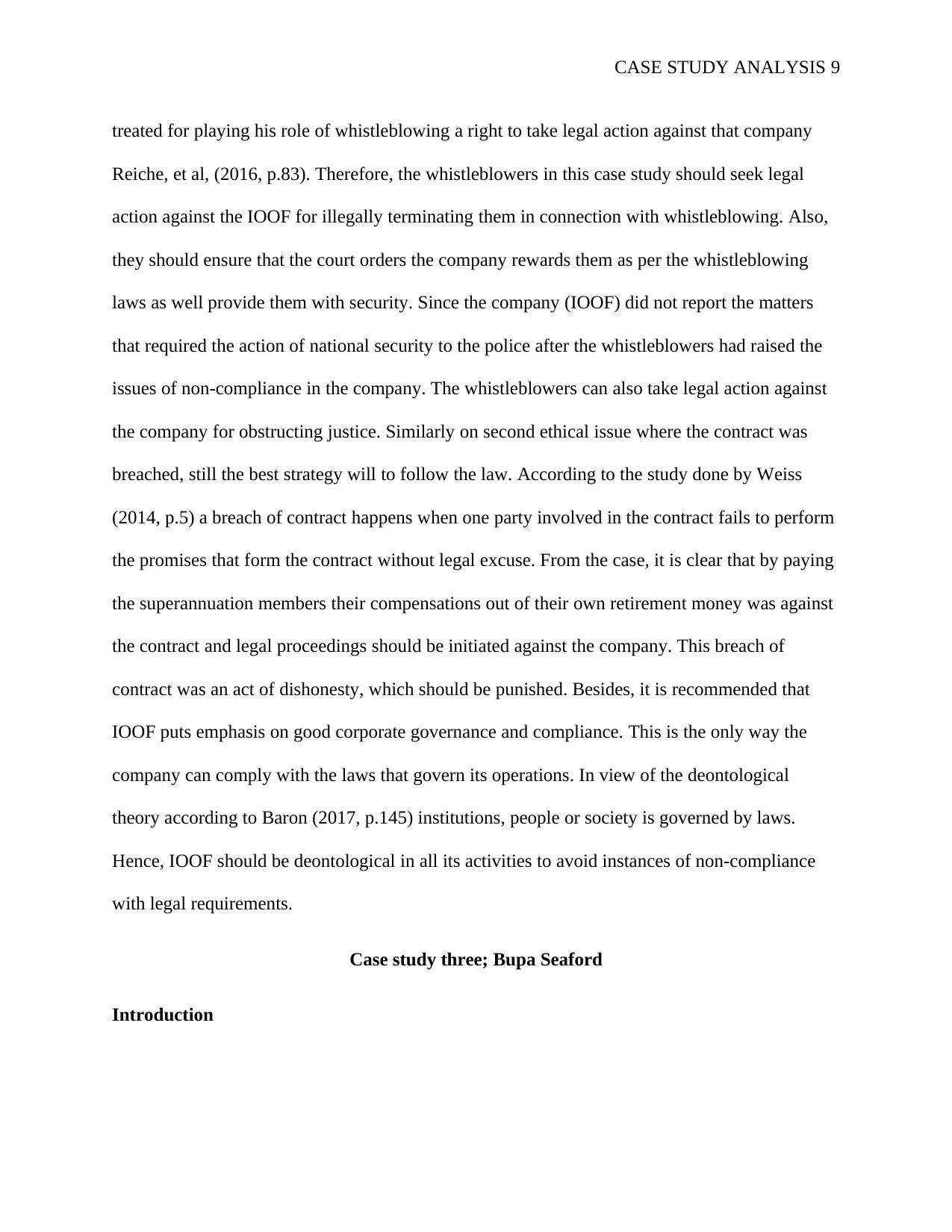
CASE STUDY ANALYSIS 9
treated for playing his role of whistleblowing a right to take legal action against that company
Reiche, et al, (2016, p.83). Therefore, the whistleblowers in this case study should seek legal
action against the IOOF for illegally terminating them in connection with whistleblowing. Also,
they should ensure that the court orders the company rewards them as per the whistleblowing
laws as well provide them with security. Since the company (IOOF) did not report the matters
that required the action of national security to the police after the whistleblowers had raised the
issues of non-compliance in the company. The whistleblowers can also take legal action against
the company for obstructing justice. Similarly on second ethical issue where the contract was
breached, still the best strategy will to follow the law. According to the study done by Weiss
(2014, p.5) a breach of contract happens when one party involved in the contract fails to perform
the promises that form the contract without legal excuse. From the case, it is clear that by paying
the superannuation members their compensations out of their own retirement money was against
the contract and legal proceedings should be initiated against the company. This breach of
contract was an act of dishonesty, which should be punished. Besides, it is recommended that
IOOF puts emphasis on good corporate governance and compliance. This is the only way the
company can comply with the laws that govern its operations. In view of the deontological
theory according to Baron (2017, p.145) institutions, people or society is governed by laws.
Hence, IOOF should be deontological in all its activities to avoid instances of non-compliance
with legal requirements.
Case study three; Bupa Seaford
Introduction
treated for playing his role of whistleblowing a right to take legal action against that company
Reiche, et al, (2016, p.83). Therefore, the whistleblowers in this case study should seek legal
action against the IOOF for illegally terminating them in connection with whistleblowing. Also,
they should ensure that the court orders the company rewards them as per the whistleblowing
laws as well provide them with security. Since the company (IOOF) did not report the matters
that required the action of national security to the police after the whistleblowers had raised the
issues of non-compliance in the company. The whistleblowers can also take legal action against
the company for obstructing justice. Similarly on second ethical issue where the contract was
breached, still the best strategy will to follow the law. According to the study done by Weiss
(2014, p.5) a breach of contract happens when one party involved in the contract fails to perform
the promises that form the contract without legal excuse. From the case, it is clear that by paying
the superannuation members their compensations out of their own retirement money was against
the contract and legal proceedings should be initiated against the company. This breach of
contract was an act of dishonesty, which should be punished. Besides, it is recommended that
IOOF puts emphasis on good corporate governance and compliance. This is the only way the
company can comply with the laws that govern its operations. In view of the deontological
theory according to Baron (2017, p.145) institutions, people or society is governed by laws.
Hence, IOOF should be deontological in all its activities to avoid instances of non-compliance
with legal requirements.
Case study three; Bupa Seaford
Introduction
⊘ This is a preview!⊘
Do you want full access?
Subscribe today to unlock all pages.

Trusted by 1+ million students worldwide
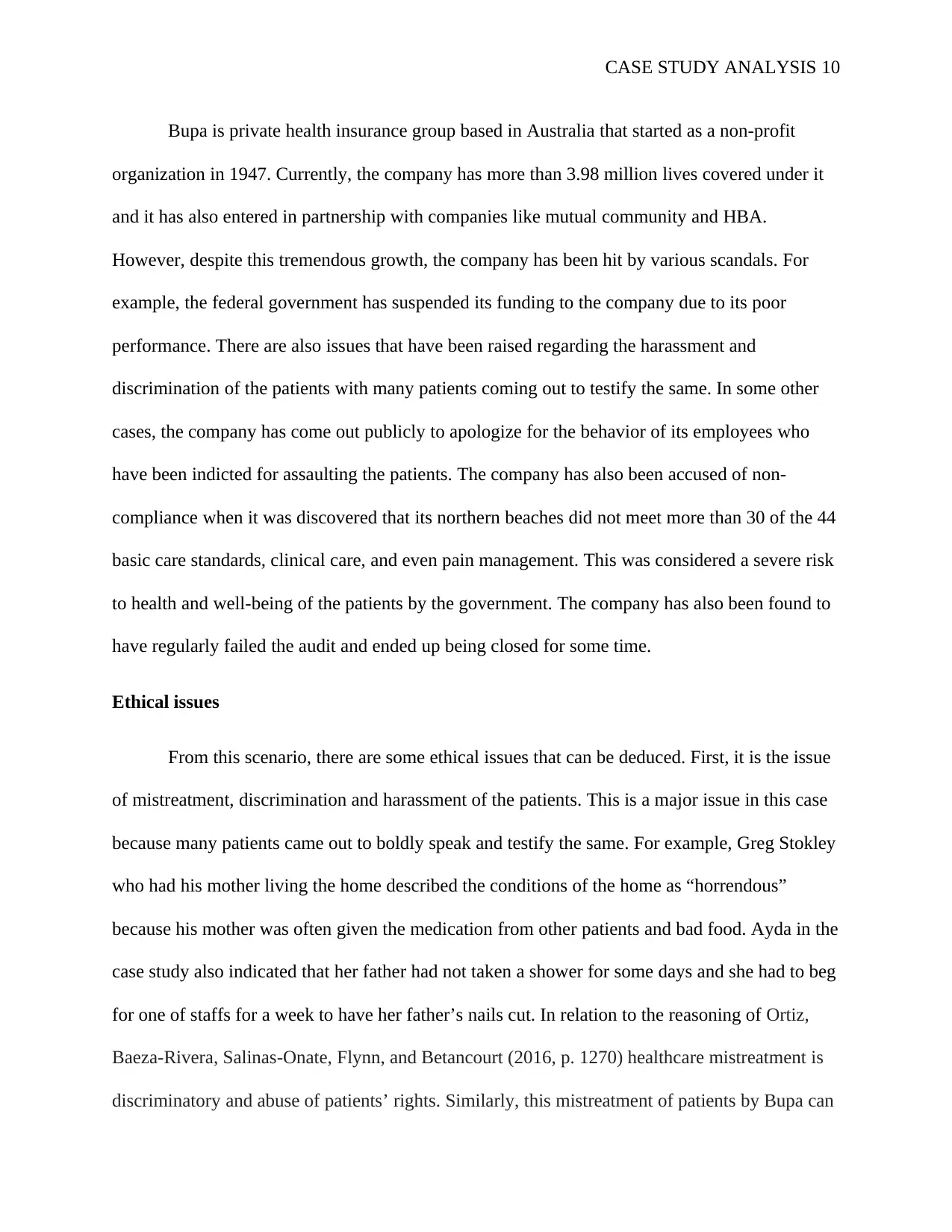
CASE STUDY ANALYSIS 10
Bupa is private health insurance group based in Australia that started as a non-profit
organization in 1947. Currently, the company has more than 3.98 million lives covered under it
and it has also entered in partnership with companies like mutual community and HBA.
However, despite this tremendous growth, the company has been hit by various scandals. For
example, the federal government has suspended its funding to the company due to its poor
performance. There are also issues that have been raised regarding the harassment and
discrimination of the patients with many patients coming out to testify the same. In some other
cases, the company has come out publicly to apologize for the behavior of its employees who
have been indicted for assaulting the patients. The company has also been accused of non-
compliance when it was discovered that its northern beaches did not meet more than 30 of the 44
basic care standards, clinical care, and even pain management. This was considered a severe risk
to health and well-being of the patients by the government. The company has also been found to
have regularly failed the audit and ended up being closed for some time.
Ethical issues
From this scenario, there are some ethical issues that can be deduced. First, it is the issue
of mistreatment, discrimination and harassment of the patients. This is a major issue in this case
because many patients came out to boldly speak and testify the same. For example, Greg Stokley
who had his mother living the home described the conditions of the home as “horrendous”
because his mother was often given the medication from other patients and bad food. Ayda in the
case study also indicated that her father had not taken a shower for some days and she had to beg
for one of staffs for a week to have her father’s nails cut. In relation to the reasoning of Ortiz,
Baeza-Rivera, Salinas-Onate, Flynn, and Betancourt (2016, p. 1270) healthcare mistreatment is
discriminatory and abuse of patients’ rights. Similarly, this mistreatment of patients by Bupa can
Bupa is private health insurance group based in Australia that started as a non-profit
organization in 1947. Currently, the company has more than 3.98 million lives covered under it
and it has also entered in partnership with companies like mutual community and HBA.
However, despite this tremendous growth, the company has been hit by various scandals. For
example, the federal government has suspended its funding to the company due to its poor
performance. There are also issues that have been raised regarding the harassment and
discrimination of the patients with many patients coming out to testify the same. In some other
cases, the company has come out publicly to apologize for the behavior of its employees who
have been indicted for assaulting the patients. The company has also been accused of non-
compliance when it was discovered that its northern beaches did not meet more than 30 of the 44
basic care standards, clinical care, and even pain management. This was considered a severe risk
to health and well-being of the patients by the government. The company has also been found to
have regularly failed the audit and ended up being closed for some time.
Ethical issues
From this scenario, there are some ethical issues that can be deduced. First, it is the issue
of mistreatment, discrimination and harassment of the patients. This is a major issue in this case
because many patients came out to boldly speak and testify the same. For example, Greg Stokley
who had his mother living the home described the conditions of the home as “horrendous”
because his mother was often given the medication from other patients and bad food. Ayda in the
case study also indicated that her father had not taken a shower for some days and she had to beg
for one of staffs for a week to have her father’s nails cut. In relation to the reasoning of Ortiz,
Baeza-Rivera, Salinas-Onate, Flynn, and Betancourt (2016, p. 1270) healthcare mistreatment is
discriminatory and abuse of patients’ rights. Similarly, this mistreatment of patients by Bupa can
Paraphrase This Document
Need a fresh take? Get an instant paraphrase of this document with our AI Paraphraser
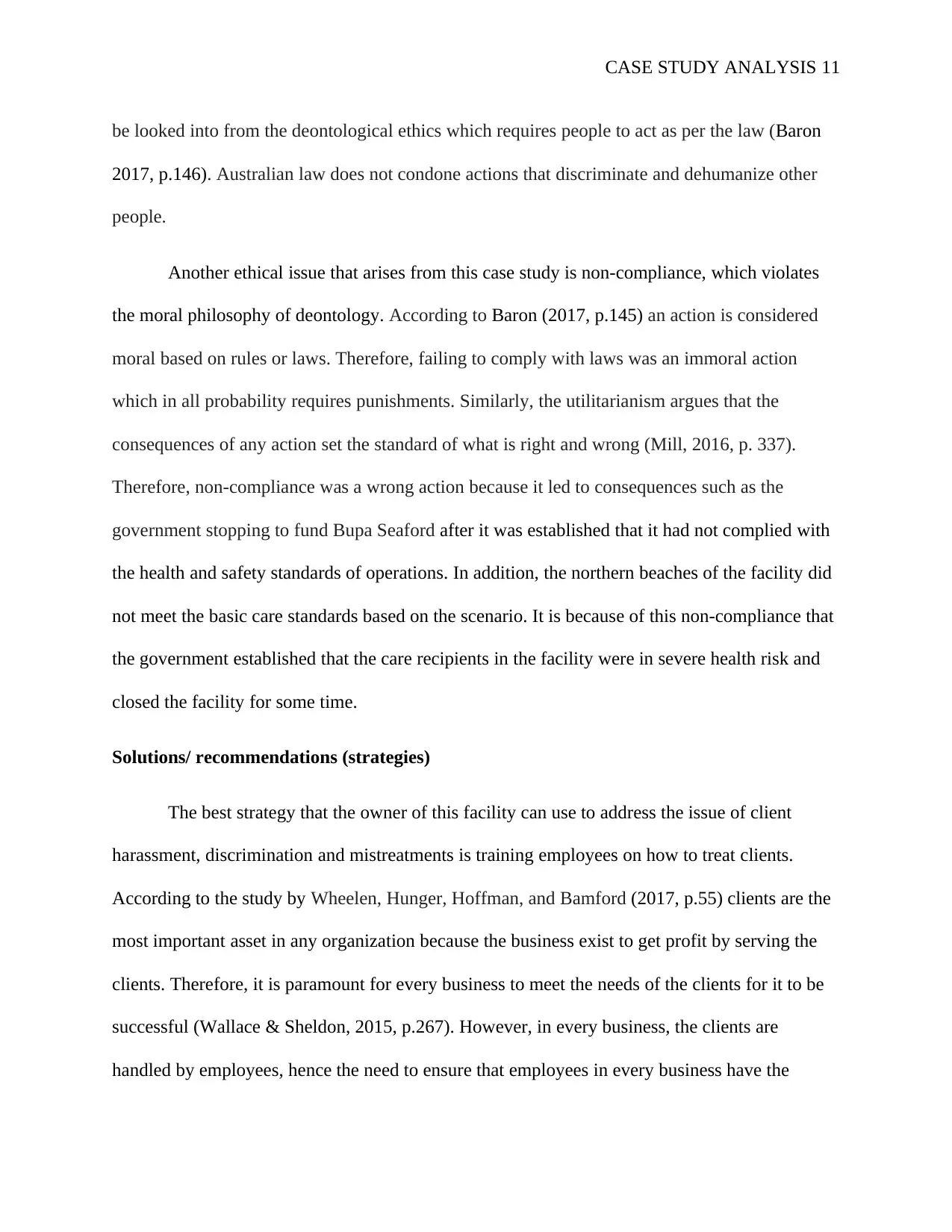
CASE STUDY ANALYSIS 11
be looked into from the deontological ethics which requires people to act as per the law (Baron
2017, p.146). Australian law does not condone actions that discriminate and dehumanize other
people.
Another ethical issue that arises from this case study is non-compliance, which violates
the moral philosophy of deontology. According to Baron (2017, p.145) an action is considered
moral based on rules or laws. Therefore, failing to comply with laws was an immoral action
which in all probability requires punishments. Similarly, the utilitarianism argues that the
consequences of any action set the standard of what is right and wrong (Mill, 2016, p. 337).
Therefore, non-compliance was a wrong action because it led to consequences such as the
government stopping to fund Bupa Seaford after it was established that it had not complied with
the health and safety standards of operations. In addition, the northern beaches of the facility did
not meet the basic care standards based on the scenario. It is because of this non-compliance that
the government established that the care recipients in the facility were in severe health risk and
closed the facility for some time.
Solutions/ recommendations (strategies)
The best strategy that the owner of this facility can use to address the issue of client
harassment, discrimination and mistreatments is training employees on how to treat clients.
According to the study by Wheelen, Hunger, Hoffman, and Bamford (2017, p.55) clients are the
most important asset in any organization because the business exist to get profit by serving the
clients. Therefore, it is paramount for every business to meet the needs of the clients for it to be
successful (Wallace & Sheldon, 2015, p.267). However, in every business, the clients are
handled by employees, hence the need to ensure that employees in every business have the
be looked into from the deontological ethics which requires people to act as per the law (Baron
2017, p.146). Australian law does not condone actions that discriminate and dehumanize other
people.
Another ethical issue that arises from this case study is non-compliance, which violates
the moral philosophy of deontology. According to Baron (2017, p.145) an action is considered
moral based on rules or laws. Therefore, failing to comply with laws was an immoral action
which in all probability requires punishments. Similarly, the utilitarianism argues that the
consequences of any action set the standard of what is right and wrong (Mill, 2016, p. 337).
Therefore, non-compliance was a wrong action because it led to consequences such as the
government stopping to fund Bupa Seaford after it was established that it had not complied with
the health and safety standards of operations. In addition, the northern beaches of the facility did
not meet the basic care standards based on the scenario. It is because of this non-compliance that
the government established that the care recipients in the facility were in severe health risk and
closed the facility for some time.
Solutions/ recommendations (strategies)
The best strategy that the owner of this facility can use to address the issue of client
harassment, discrimination and mistreatments is training employees on how to treat clients.
According to the study by Wheelen, Hunger, Hoffman, and Bamford (2017, p.55) clients are the
most important asset in any organization because the business exist to get profit by serving the
clients. Therefore, it is paramount for every business to meet the needs of the clients for it to be
successful (Wallace & Sheldon, 2015, p.267). However, in every business, the clients are
handled by employees, hence the need to ensure that employees in every business have the
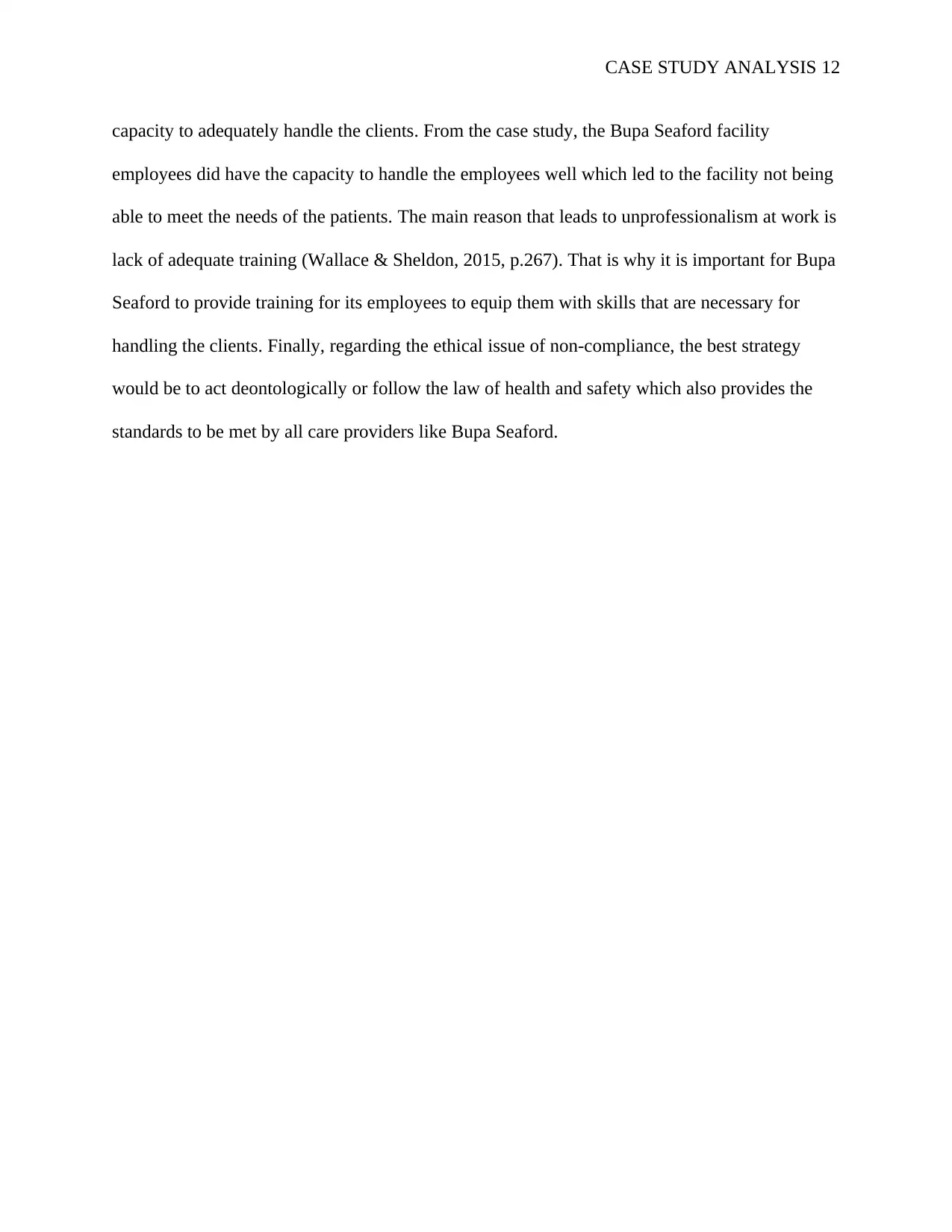
CASE STUDY ANALYSIS 12
capacity to adequately handle the clients. From the case study, the Bupa Seaford facility
employees did have the capacity to handle the employees well which led to the facility not being
able to meet the needs of the patients. The main reason that leads to unprofessionalism at work is
lack of adequate training (Wallace & Sheldon, 2015, p.267). That is why it is important for Bupa
Seaford to provide training for its employees to equip them with skills that are necessary for
handling the clients. Finally, regarding the ethical issue of non-compliance, the best strategy
would be to act deontologically or follow the law of health and safety which also provides the
standards to be met by all care providers like Bupa Seaford.
capacity to adequately handle the clients. From the case study, the Bupa Seaford facility
employees did have the capacity to handle the employees well which led to the facility not being
able to meet the needs of the patients. The main reason that leads to unprofessionalism at work is
lack of adequate training (Wallace & Sheldon, 2015, p.267). That is why it is important for Bupa
Seaford to provide training for its employees to equip them with skills that are necessary for
handling the clients. Finally, regarding the ethical issue of non-compliance, the best strategy
would be to act deontologically or follow the law of health and safety which also provides the
standards to be met by all care providers like Bupa Seaford.
⊘ This is a preview!⊘
Do you want full access?
Subscribe today to unlock all pages.

Trusted by 1+ million students worldwide
1 out of 16
Your All-in-One AI-Powered Toolkit for Academic Success.
+13062052269
info@desklib.com
Available 24*7 on WhatsApp / Email
![[object Object]](/_next/static/media/star-bottom.7253800d.svg)
Unlock your academic potential
Copyright © 2020–2026 A2Z Services. All Rights Reserved. Developed and managed by ZUCOL.


